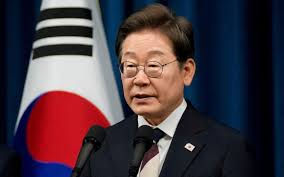South Korea's President Skips NATO Talks: A Shift in Regional Priorities?
- Lucas Johnson

- Jun 27, 2025
- 2 min read
Seoul, South Korea — June 27, 2025In a move that surprised international observers, South Korean President Lee Jae-myung skipped high-level NATO meetings held in The Hague, fueling debate about the country's evolving global posture and foreign policy strategy.
While the Blue House (South Korea’s presidential office) cited “domestic policy priorities” for his absence, critics and analysts are reading deeper into the implications—especially amid rising regional tensions and expanding diplomatic ties across East Asia.
A Step Away from Transatlantic Alignment?
South Korea has attended recent NATO summits as a non-member partner, especially under the previous Yoon Suk-yeol administration, which strengthened ties with the U.S.-led alliance. President Lee’s decision to step back suggests a shift toward a more autonomous and Asia-centric foreign policy—a key campaign promise during his 2022 election run.
“This doesn’t signal anti-Western sentiment,” said Dr. Hannah Rhee, a political analyst at Seoul National University. “But it does indicate a pivot—South Korea is trying to lead more in regional matters, especially with ASEAN, China, and Japan.”
Lee has recently ramped up diplomatic initiatives with Southeast Asia and resumed high-level talks with North Korea—most notably the Panmunjom dialogue earlier this month, the first of its kind in over two years. Meanwhile, trade agreements and tech partnerships with Indonesia, Vietnam, and India have gained momentum.
This recalibration appears designed to balance global influence, particularly as the U.S.-China rivalry continues to intensify across the Indo-Pacific.
Domestic Politics or Strategic Realignment?
At home, Lee faces increasing political pressure over inflation and housing reforms, which could have contributed to his decision to remain in South Korea. However, some analysts argue the move was also intended to reinforce his “Korea-first” diplomatic identity.
“It’s a calculated choice,” added Dr. Rhee. “By skipping the NATO meeting, Lee is signaling that South Korea no longer wants to play second fiddle to Western priorities.”
Global Reaction
While NATO officials expressed “disappointment,” they also acknowledged Seoul’s ongoing cooperation in cyber defense and arms innovation. The U.S. State Department downplayed the absence, stating that “the ROK remains a vital partner in regional and global security.”





Comments